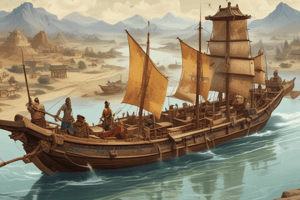Podcast
Questions and Answers
What changes did Liu Bang bring to China?
What changes did Liu Bang bring to China?
He made the government less strict, lowered taxes, was more lenient with punishment, and changed the structure of the government.
How did Wudi strengthen China's government?
How did Wudi strengthen China's government?
He took land, raised taxes, and placed the supply of grain in the government's control.
Would you rather have lived under the rule of Liu Bang or Wudi?
Would you rather have lived under the rule of Liu Bang or Wudi?
Liu Bang because it seemed he wasn't as strict or harsh and had a fair judgment.
How was the Han government based on the ideas of Confucius?
How was the Han government based on the ideas of Confucius?
What were the social classes in Han China?
What were the social classes in Han China?
Why were wealthy merchants in the lowest class?
Why were wealthy merchants in the lowest class?
How were Han social classes different from most social divisions?
How were Han social classes different from most social divisions?
Why did the family take on such importance during the Han dynasty?
Why did the family take on such importance during the Han dynasty?
Flashcards
Liu Bang's Changes to China
Liu Bang's Changes to China
Less strict government, lower taxes, more lenient punishment, and a changed government structure.
Wudi's Strengthening of Government
Wudi's Strengthening of Government
He took land, raised taxes, and controlled the grain supply.
Confucianism in Han Government
Confucianism in Han Government
Respecting elders was important; failure was punishable by death.
Social Classes in Han China
Social Classes in Han China
Signup and view all the flashcards
Why Merchants Were Lowest Class
Why Merchants Were Lowest Class
Signup and view all the flashcards
Han Social Classes vs. Other Divisions
Han Social Classes vs. Other Divisions
Signup and view all the flashcards
Importance of Family During Han Dynasty
Importance of Family During Han Dynasty
Signup and view all the flashcards
Study Notes
Changes Under Liu Bang
- Liu Bang implemented a lenient government approach, reducing strictness.
- Taxes were lowered, making it easier on the populace.
- He restructured the government for greater accessibility.
Strengthening Under Wudi
- Emperor Wudi consolidated power by confiscating land from the aristocracy.
- Raised taxes to support a strong central government.
- Government assumed control of grain supplies, ensuring stability.
Preference in Leadership
- Liu Bang is preferred for his fair judgments and less oppressive rule.
- Wudi's governance was characterized by strictness that some may find harsh.
Confucian Influence in Government
- The Han government incorporated Confucian principles, emphasizing respect for elders.
- Punishments for disrespect, including death, highlight the rigid adherence to these teachings.
Social Classes in Han China
- Top class included the emperor, his court, and scholars in government roles.
- The largest class comprised peasants, vital to agrarian society.
- Artisans formed the third class, creating valuable goods.
- Merchants, despite wealth, were in the lowest class due to their roles in trade.
Wealthy Merchants' Class Status
- Merchants ranked lowest because their profession focused on buying and selling rather than creating.
Unique Social Class Structures
- Han social classes prioritized social status over wealth, differing from many other cultures.
Importance of Family
- Family was central to Han culture, with teachings emphasizing the need to honor familial relationships.
Studying That Suits You
Use AI to generate personalized quizzes and flashcards to suit your learning preferences.




